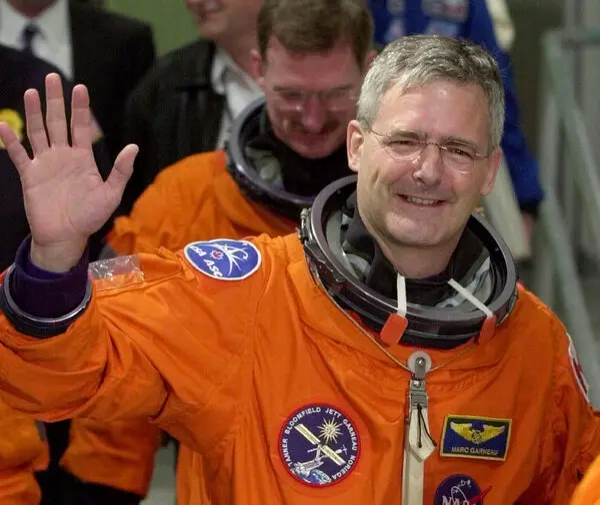
1949 - 2025
Marc Garneau was born February 26, 1949, in Quebec City, Quebec. He started his military career at CMR Saint-Jean and graduated from RMC in 1970 with a BSc degree in Engineering Physics. In his graduation year, he was presented the HRH Prince of Wales Cup for athletic performance. Upon graduation he was awarded the Athlone Fellowship, which took him to the Imperial College of Science and Technology, in London, England, where he earned a Doctorate in Electrical Engineering in 1973.
As a Naval Officer, Garneau served 10 years as a Combat Systems Engineer. During this time, he designed a simulator for training officers in the use of missile systems aboard Tribal-class destroyers and contributed to the development of an aircraft-towed target system for scoring the accuracy of naval gunnery exercises.
Garneau was promoted to Commander in 1983 while he was attending the Canadian Forces Command and Staff College. In the same year, out of 4,300 applicants, he was one of the six chosen to become the first astronauts in the incipient Canadian Astronaut Program. Shortly thereafter, Garneau was named the first of this group to fly and he was seconded from the CAF to the Canadian Astronaut Program to begin a short period of rigorous training at the Johnson Space Center in Houston, Texas. His first flight, STS-41G, was aboard the space shuttle Challenger from October 5 - 13, 1984, as a payload specialist, becoming the first Canadian to fly in space.
Garneau was promoted to Captain(N) in 1986. In 1989, after more than 23 years of service, he left the CAF to become deputy director of the Canadian Astronaut Program. In this role, he provided technical and program support in the preparation of experiments to fly during future Canadian missions.
In 1992, he was selected for mission specialist astronaut training with the US National Aeronautics and Space Administration (NASA). After a year of rigorous training, he was qualified to fly on the orbiter and to perform robotic and extra-vehicular activities. While at NASA, Garneau was assigned to Capsule Communicator duties, becoming the first non-American to communicate with the shuttle crew from Mission Control. He would fly on two more shuttle missions, both aboard the space shuttle Endeavour. He was a mission specialist on flight STS-77, from May 19 - 29, 1996, and was a mission specialist and flight engineer on flight STS-97, from November 30 - December 11, 2000.
In 2001, Garneau was appointed Executive Vice-President of the Canadian Space Agency (CSA), and later that year became its President. As President of the CSA, he drafted the Canadian Space Strategy, a government policy document that defined the mandate and long-term vision of the Canadian Space Program. Several major programs were initiated or completed under his leadership. Existing partnerships with NASA, the European, Russian and Japanese Space Agencies were renewed, and new partnerships were created with other countries. During his tenure as President, Garneau also focused on building stronger links between the CSA and its stakeholders, the scientific community, government and industry.
In 2003, Garneau was named Chancellor of Carleton University, a position he held until 2008.
In 2005, Garneau resigned as President of the CSA to seek political office. He was first elected as Member of Parliament for the Montreal Riding of Westmount – Ville Marie in 2008. He would win re-election in this and its successor riding of Notre-Dame-de-Grâce – Westmount in four consecutive elections.
While in opposition, Garneau’s various roles included serving as House Leader for the Liberal Party, critic for foreign affairs, as well as natural resources critic. He also co-chaired the Liberal Party International Affairs Council of Advisors.
In November 2015, Garneau was appointed to the Queen’s Privy Council for Canada and named Minister of Transportation, a position he served in for over five years. From January to October 2021, Garneau was Canada’s Minister of Foreign Affairs. Following his time in Cabinet, Garneau served as Chair of the House of Commons Committee on Indigenous and Northern Affairs, and as Joint Chair of the Committee on Medical Assistance in Dying. He resigned from the House of Commons in 2023 and retired from politics.
As the first Canadian to fly in space, Garneau was appointed an Officer of the Order of Canada in 1984. He was promoted to Companion of this order in 2003 in recognition of his extensive work with the Canadian space program. He has received honorary degrees from numerous universities; been inducted into the Canadian Aviation and the International Space Halls of Fame; and was awarded the NASA Exceptional Service Award. Garneau has appeared on a Canadian postage stamp and has two schools named after him. Asteroid (14094) Garneau is named in his honour.
Plaque inscription:
Engineer, Astronaut, Statesman